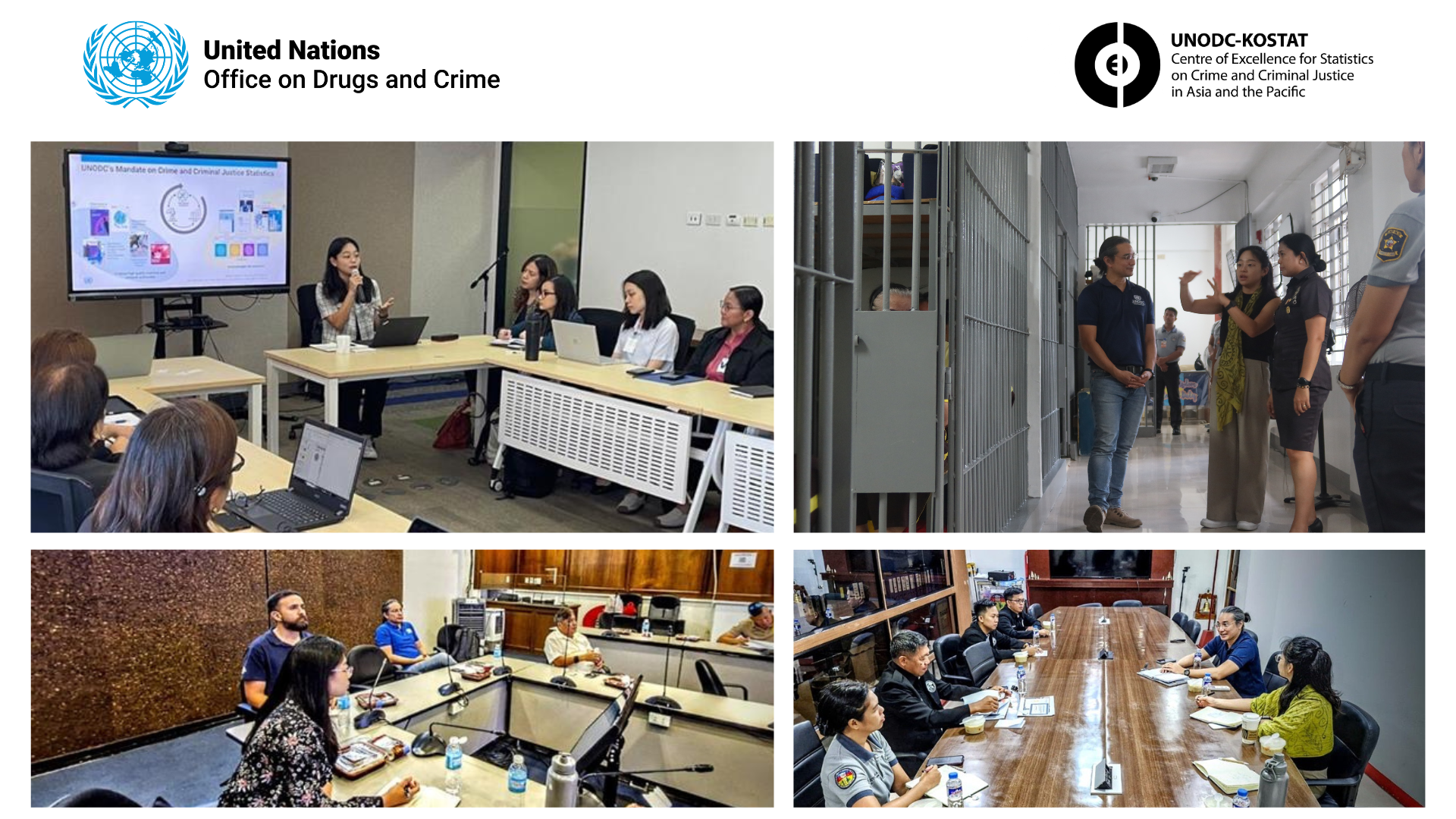
Manila, Philippines, 28 April – 1 May 2025 - The UNODC Centre of Excellence for Statistics on Crime and Criminal Justice in Asia and the Pacific (CoE) reinforced its partnership with Philippine authorities during a scoping mission focused on enhancing crime statistics and prison data management. Through technical dialogue and field engagement, the mission marked a significant step toward strengthening transparency, efficiency, and data-driven decision-making in the Philippine criminal justice system.
Jointly organized by the CoE and the UNODC Philippines Country Office, the mission focused on two priority areas: aligning crime statistics with international standards and supporting practical solutions to manage time allowances for persons deprived of liberty (PDLs). The CoE was represented by Jisu Kim, Statistical Officer, to conduct technical discussions and field engagements.
International Classification of Crime for Statistical Purposes Implementation
The mission opened with a national forum on the International Classification of Crime for Statistical Purposes (ICCS), jointly organized by UNODC and Philippine criminal justice agencies at the UN House in Mandaluyong City. The forum convened over eight national institutions, includingthe Bureau of Corrections (BuCor), Department of Interior and Local Government (DILG), Department of Justice (DOJ), National Police Commission (NAPOLCOM), Philippine National Police (PNP), National Bureau of Investigation (NBI), Philippines Statistics Authority (PSA), UP Law Center – Institute of Government and Law Reform, Philippine Drug Enforcement Agency (PDEA),to advance efforts to modernize crime and criminal justice statistics.
The Philippines has made steady progress in this area, particularly through the development of the Philippine Crime Classification System (PCCS) in 2018. With the PCCS scheduled for an update in 2026, stakeholders are working to align it further with the ICCS and strengthen interoperability across agencies. The Philippine Development Plan 2023–2028 also highlights the creation of a unified crime index database in alignment with the ICCS as a national priority.
Discussions focused on practical ways to integrate the ICCS implementation into existing national initiatives such as the PCCS update and the DOJ’s Single Carpeta System. Notably, the UP Law Center, commissioned by the DOJ, has developed and regularly updates a correspondence table aligning Philippine criminal laws and the PCCS with the ICCS - an essential tool for supporting integration.
Participants outlined several areas for future collaboration, including the gradual incorporation of ICCS categories into national classifications and crime and criminal justice data production, joint assessments of crime data management platforms, and co-production of analytical reports on crime trends. These discussions laid the foundation for sustained technical collaboration and capacity-building.
Supporting Practical Improvements in Time Allowance Management
The mission also addressed key challenges in managing time allowances for PDLs, an important mechanism for ensuring fair and timely release based on earned credits.
In discussions with BJMP and BuCor, UNODC reviewed the data management systems that support time allowance calculations. While platforms such as the Single Carpeta System and One BuCorPortal are in place, some modules remain under development or inactive, limiting the automation of processes. Both agencies expressed strong commitment to advancing these efforts and welcomed UNODC’s technical support.
As an interim measure, UNODC introduced the Time Allowance Calculator, co-developed by the CoE and UNODC Philippines, to help facility-level officers calculate release dates based on earned credits. Pilots of the tool are already underway in selected jails, supporting a smoother and more transparent process.
Field visits to facilities such as the Quezon City Jail - Female Dormitory offered practical insights into how records are managed at the operational level. Despite limited resources, staff showed innovation in rehabilitation programmes and a strong commitment to improving data practices.Officers managing time allowances welcomed the calculator and requested further guidance to integrate it into their work.
At the New Bilibid Prison’s Reception and Diagnostic Center (RDC), discussions focused on improving documentation practices for newly admitted inmates, particularly the timely and standardized recording of detention dates and time credit certificatescritical for accurate time allowance calculations.
Strengthening Partnerships for Safer, Fairer Justice Systems
UNODC and Philippine counterparts set out plans to build on the momentum of this mission by expanding collaboration across several interconnected areas. Philippine agencies were invited to participate in the upcoming regional UN Crime Trends Survey (UN-CTS) focal points meeting, enhancingthe Philippines’ engagement in international crime data reporting. Further joint efforts were envisioned to advance the integration of the ICCS, prepare for the next Crime Victimization Survey (CVS), and improve the interoperability of justice sector data systems.